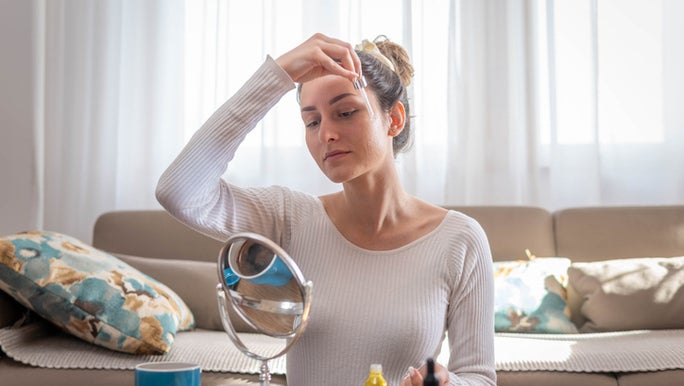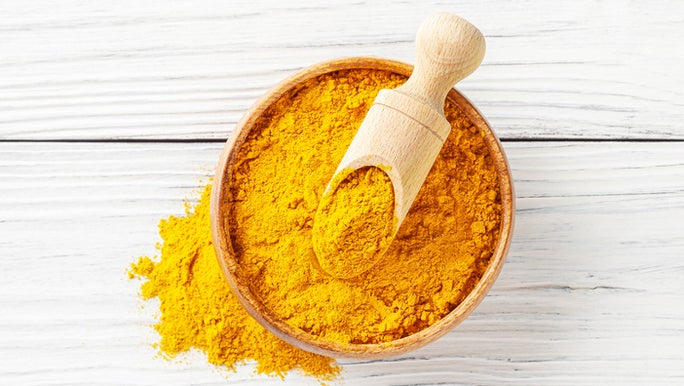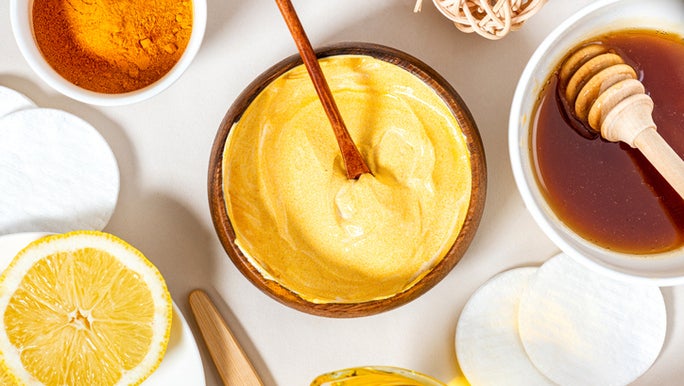Key Points
- The use of turmeric for health and skincare can be traced back to ancient times.
- Early evidence suggests that turmeric may be helpful in treating a range of skin conditions.
- One way to benefit from turmeric’s antioxidant, antimicrobial and anti-inflammatory effects may be to apply it as a face mask.
Want a more radiant, luminous complexion? You may have heard that turmeric products – both oral and topical – may quickly improve your skin in several ways. But do they really work?
The use of turmeric for health and skincare can be traced back to ancient times. Today, this golden-hued spice is still widely used in cooking, medicine and beauty products around the world, with many people believing it may benefit our health and appearance in various ways.
In this article, Naturopath Gabbie Watt explores the potential benefits of turmeric for skin health and explains ways to try it for yourself.
What are turmeric’s benefits for skin?
Turmeric, a commonly used spice derived from the curcuma longa plant, is easily available as a ground spice, in supplements or in topical beauty products. Its potent flavour and bright yellow-orange colouring make it a popular ingredient in cooking, but what’s the benefit of using turmeric for skin health?
“Turmeric has many benefits for treating inflammatory skin conditions and oxidative damage,” says Gabbie.
Early evidence suggests that curcumin, the active ingredient in turmeric, may be helpful in treating a range of skin conditions, including:
- Acne. A 2017 study found that turmeric extracts may be a source of natural anti-acne-inducing bacteria.
- Ageing. A 2019 study suggested that the anti-inflammatory and antioxidant effects of turmeric could help prevent skin ageing, but further research is needed.
- Atopic dermatitis (mild eczema). Topical turmeric formulations are shown to reduce skin swelling, redness and itching, making it a possible treatment option for mild eczema.
- Free radical damage. As an antioxidant, turmeric may help protect the skin from free radical damage caused by environmental and lifestyle stress.
- Itching. In a 2014 study involving dialysis patients, turmeric capsules were shown to relieve skin itching.
- Mouth sores. A 2022 study showed that turmeric’s antioxidant and anti-inflammatory properties can help reduce pain and burning resulting from mouth sores.
- Skin wounds. Turmeric has been found to help skin wounds heal faster when applied topically, thanks to its anti-inflammatory effects.
If you are experiencing a skin condition, it’s important to contact your healthcare professional to create a treatment plan. If you decide to try using turmeric for skin health, make sure to discuss it with a healthcare professional first.

You can buy a turmeric face mask with a blend of ingredients that won’t stain your skin, or make your own at home
How long do you leave turmeric on your face?
One way to benefit from turmeric’s antioxidant, antimicrobial and anti-inflammatory effects may be to apply it as a face mask. Worried about turmeric staining your skin? You might like to opt for store-bought masks.
“The bright yellow pigment in turmeric has the potential to stain the skin,” explains Gabbie, “so you can instead apply products that have been specifically formulated to prevent staining of the skin.”
Before you apply your mask, make sure to first perform a patch test to ensure no irritation will occur. If you’re using a commercial mask, follow the directions on the packaging.

Turmeric serums may brighten, plump and balance the skin
How long does it take for turmeric to work?
Some turmeric skincare products suggest they’ll provide an instant glow. But according to Gabbie, the benefits of turmeric for skin will vary from person to person.
“For topical products, it depends on your skin type and individual circumstances,” she says. “For turmeric capsules, it depends on the personal health and lifestyle factors that may influence your health.”
The answer to how long turmeric takes to work may become clearer as research into turmeric for skin health continues.
What turmeric skincare products are beneficial?
A wide range of turmeric-infused skincare products are available for purchase, including one-a-day capsules taken orally as well as topical body oils, serums and even facial sponges.
When considering your options, it’s important to know that turmeric has a low bioavailability when ingested. “However,” says Gabbie, “emerging research suggests that black pepper may increase the bioavailability of turmeric and enhance its absorption when ingested at the same time.”
So if you choose to try turmeric supplements, you might like to look for a product that contains black pepper (also referred to as piperine).
The benefits of using a turmeric serum
Serums are a popular form of turmeric-infused skincare due to their ability to deliver concentrated doses of turmeric’s beneficial compounds. A wide variety of turmeric serums are available to address specific skin concerns, including hyperpigmentation, dullness or uneven skin texture, as well as conditions like acne and mild eczema.
Many turmeric serums promise to brighten, plump and balance the skin, resulting in a glowing, even-toned complexion. They may also help protect against free radicals.

Research into the benefits of turmeric for skin is ongoing
A vibrant addition to your skincare routine
Research into turmeric’s benefits for skin health are ongoing, but the results have been promising so far. So whether taken orally or applied topically, turmeric may be a great addition to your self-care routine.
If you have specific skin concerns, consult your healthcare professional. They will be able to suggest treatment options and advise whether turmeric may work for you.
Related:
Gabbie Watt is a Naturopath and is passionate about blending evidence-based practice and traditional natural medicine into her approach. With experience previously working as a Radiation Therapist, Gabbie’s professional background in conventional medicine has been instrumental in shaping her holistic approach to health.
Reviewed by healthylife health experts July 2023.



